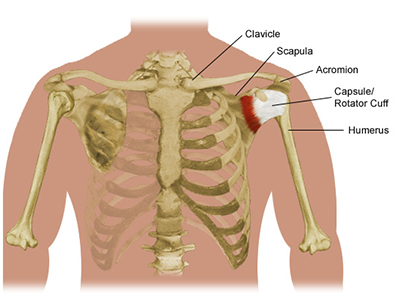Rotator Cuff Injury
 What is rotator cuff injury?
What is rotator cuff injury?
The rotator cuff consists of muscles and tendons that hold the shoulder in place. It is one of the most important parts of the shoulder. The rotator cuff allows a person to lift his/her arms and reach up. An injury to the rotator cuff, such as a tear, may happen suddenly when falling on an outstretched hand or develop over time due to repetitive activities. Rotator cuff tears are also due to aging.
What are the symptoms of a rotator cuff tear?
The following are the most common symptoms of a rotator cuff tear. However, each individual may experience symptoms differently. Symptoms may include:
-
Recurrent pain, especially with certain activities
-
Pain that prevents sleeping on the injured side
-
Grating or cracking sounds when moving the arm
-
Limited ability to move the arm
-
Muscle weakness
The symptoms of a rotator cuff tear may resemble other conditions or medical problems. Always consult your physician for a diagnosis.
How is a rotator cuff injury diagnosed?
In addition to a complete medical history and physical examination, diagnostic procedures for a rotator cuff injury may include the following:
-
X-ray - a diagnostic test that uses invisible electromagnetic energy beams to produce images of internal tissues, bones, and organs onto film.
-
Magnetic resonance imaging (MRI) is a diagnostic procedure that uses a combination of large magnets, radio frequencies, and a computer to produce detailed images of organs and structures within the body.
A rotator cuff may tear partially or fully. Partial-thickness tears do not completely sever the tendon from the shoulder.
Treatment for a rotator cuff injury
Specific treatment for a rotator cuff injury will be determined by your physician based on:
-
Your age, overall health, and medical history
-
Extent of the condition
-
Your tolerance for specific medications, procedures or therapies
-
Expectations for the course of the condition
-
Your opinion or preference
Treatment may include:
-
Rest
-
Nonsteroidal anti-inflammatory medications
-
Strengthening and stretching exercises
-
Ultrasound therapy
-
Corticosteroid injection
-
Surgery (for severe injuries)